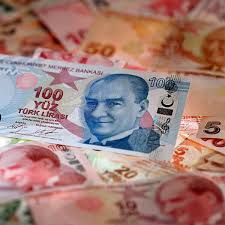Lira Contagion: Why Turkey’s Collapsing Currency Is Tainting World Markets

The Turkish lira fell by as much as 11% against the U.S. dollar Monday morning, continuing a slide that started to alarm markets late last week. The lira’s fall is now starting to take other emerging markets’ currencies with it, and there are now fears for European banks, too.
Here’s a rundown of what’s going on, and why.
How bad is the slide?
Pretty bad. The lira has lost around half its value against the dollar over the past year, and most of that is since the start of this year. Turkey’s private-sector debt is high—with much of it fueled by foreign money—and so is inflation, at an annual rate of 15.9% this month. Meanwhile, President Recep Tayyip Erdogan insists on maintaining low interest rates despite criticism from financial experts.
So the lira was already falling, but on Friday things really turned sour. That’s when U.S. President Donald Trump doubled import tariffs on Turkish steel and aluminum, partly to put pressure on the country for its continued jailing of Andrew Brunson.
Who is Andrew Brunson?
Good question.
Brunson is an evangelical American pastor who has been living in Turkey for a couple decades. He was arrested in 2016, in the wake of an attempted coup against Erdogan.
Erdogan claimed the coup attempt was organized by an imam named Muhammed Fethullah Gülen, who is living in exile in the U.S. Brunson was one of many charged with terrorism after the episode, with the authorities claiming he had links to the Gülen movement. His case has been fervently taken up by evangelicals back in the U.S., who have pressured the White House to do something.
Which it did.
In the process, the Trump administration tore up the traditional separation between using sanctions to address foreign policy issues and tariffs to address trade issues.
I have just authorized a doubling of Tariffs on Steel and Aluminum with respect to Turkey as their currency, the Turkish Lira, slides rapidly downward against our very strong Dollar! Aluminum will now be 20% and Steel 50%. Our relations with Turkey are not good at this time!
— Donald J. Trump (@realDonaldTrump) August 10, 2018
Trump’s tweet announcing the doubling of tariffs on Friday followed a claim by Erdogan that Turkey is facing “economic attacks,” and a call from the Turkish president for citizens to convert their holdings to lira. “The economic attack against us now is the same as the coup attempt against us. I’m urging our country to increase outputs, to increase exports,” Erdogan said.
The lira fell by as much as 18.5% on Friday, although it pared some of those losses to end up 14.3% down.
What’s happening in Turkey now?
Over the weekend, Erdogan continued to make fiery speeches and the Turkish central bank promised a plan to help shore up financial stability.
The first signs of that plan arrived Monday morning, including the easing of commercial lenders’ reserve requirements, and a promise to provide all the liquidity that Turkish banks need. Treasury minister Berat Albayrak promised there would be no capital controls, but the central bank has limited currency swap transactions.
Before the central bank’s announcement, the lira fell as much as 10% early Monday. Again, it pared some of those losses afterwards, to a loss of around 6%, but the ripples are becoming apparent.
How so?
Other emerging-market currencies are suffering too, as investors put their money into safer currencies, especially the rallying dollar. South Africa’s rand has hit a two-year low, and Russia’s ruble and India’s rupee have also hit their lowest points in a long while.
And then there are the European banks that have lent to Turkish businesses, big-time. These include Spain’s BBVA, Italy’s UniCredit and France’s BNP Paribas. Those debts are largely denominated in dollars and euros, and are therefore harder to pay with a weakening lira, so shares in these banks are all down.
The European Central Bank is worried about those banks’ exposure to Turkey, and the euro is also now slightly down against the dollar, due to contagion fears.
Shares are down in Asia, with Indonesia leading the pack with a 3% fall. The European stock markets are off slightly, and U.S. stock futures are a bit down too.






